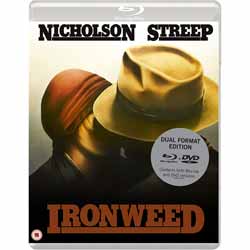|
Click here to return to the main site. Blu-ray Review
Tragedy, pure and unstinting, is always a tough sell for audiences addicted to happy jack squirrel stories of super heroes, hero-ettes and trannies with super powers triumphant in a comic book universe of wanking CGI poster blather. Jack Nicholson got $25 million for his portrayal of The Joker in Batman (1989) and reinforced his artistic stubbornness to do whatever he effing wanted. Yes, he did some wonderfully popular movies along the way but always interspersed with tragedies that were resoundingly rejected by critics and audiences alike. Between As Good As It Gets and About Schmidt is The Pledge; between Wolf and The Evening Star is The Crossing Guard; between A Few Good Men and Wolf is Hoffa; between Batman and Man Trouble is The Two Jakes; between The Shining and Reds is The Postman Always Rings Twice; and out of chronological linearity but to fit our purpose here: between Broadcast News and Batman is… Ironweed. Nicholson does not always direct these personal choices (as with The Two Jakes when he took over the helm after creative differences) trusting himself to directors who share his unflinching vision, in the case of Ironweed choosing to work with director Hector Babenco fresh off his success with Kiss of the Spider Woman (1985) which scored an Oscar for William Hurt as one of the most memorable transsexuals in film history. Ironweed was budgeted at $27 million and accumulated barely $7 million worldwide. Babenco went on to shoot At Play in the Fields of the Lord (1991) in the Amazon jungles with a leading man (Tom Berringer) he didn’t want and the picture tanked, forever relegating him to do award-winning movies outside the Hollywood crap hole. Ironweed is a study of sadness propulsed by guilt for which there is no absolution. Protagoras of Abdera (480-410 B.C.E.) saw us as the measure of all things. His theory of relativism ultimately rested on his theory of perception according to which we know only what we perceive but not the thing perceived. Jack Nicholson is the Protagoras of motion picture history. Not just a contender but a winner of the victory wreath. In 1938 Depression era upstate New York, Nicholson’s Francis Phelan is a hopeless alcoholic on the streets of Albany with other like minded lost souls. It’s just past Halloween and we hear news of Orson Welles’s infamous Martian invasion radio broadcast. But it’s not the Martians who have the street people worried, it’s winter. Staying warm is staying alive. Meryl Streep’s Helen Archer loves Francis but is bereft because her love could not and cannot heal Frannie’s inexorable guilt from twenty-two years ago when he dropped his infant son on the linoleum kitchen floor, breaking his neck. He can’t forgive himself so what does it matter if Jesus does or his wife Annie, or his lover, Helen? Helen used to be a singer on the radio but has lost everything over family betrayal and abandonment. Her heart aches that her love for Francis is not enough to rescue him from his abyss or her own. The cast is magnificent. They are a dramatic thesaurus for students of acting beginners or vets. Young Francis is the remarkable Frank Whaley (the Big Kahuna Burger customer in Pulp Fiction [1994]); Annie Phelan, Francis’s loyal wife is Caroll Baker (John Ford’s last designated great leading lady), consummately perfect; Diane Venora is his resentful daughter Peggy who in her short onscreen time demonstrates a magisterial character arc; fellow bum, Rudy, is Tom Waits (‘There must be a God that protects some bums…’) in what is probably the most poignant work of his career; and Nathan Lane plays the ghost scab bus driver who haunts Phelan’s delusions for murdering him with a hurled rock to the head. All these performances orbit around the two Oscar winning stars and it’s a case of the stellar tide raising all ships. Streep, it must be said, goes boldly where few actors fear to tread and prays on screen. Welles always said that and sex were too personal for an actor to do believably without looking like a fool or a cow. Streep is also yoked into giving a bum a hand job for the privilege of sitting inside his junk car shelter. Her facial instrumentality here is a veritable feminist fugue consummated with discarding her fingerless gloves afterwards and baptizing her hands in muddy water. She sings too. Her rendering of ‘He’s Me Pal’ in a smoky saloon is nakedly perfect and we see she is not without her delirium as well. 1938 Depression America is depicted flawlessly courtesy of Albany, New York locations crafted by Art Director Robert Guerra and Set Decorator Leslie Pope. It’s clear that Nicholson didn’t demand $25 million for his fee. Most of the budget is on the screen. While numbnuts American marketers and audiences shunned the film based on the Pulitzer Prize winning novel and screenplay by William Kennedy, BAFTA awarded Nicholson Best Actor of the year and the Cannes Festival gave Ironweed its best picture honour. To be fair, The Los Angeles Film Critics Association and The New York Film Critics Circle both heaped honours on the picture and Nicholson’s performance but to little avail with the American zombie public. Eureka’s remastered Dual Blu-ray of the HBO Production is, as to be expected, a cut diamond of technical perfection. If this movie is to be found by people who appreciate it, it will be here and not the Peoples’ Republic of Malibu. Jack Nicholson is gone from us now. Self admitted dementia. Ironweed is painfully ironic. It is a testament to his bravery and that of all involved. If you take your tragedy straight with no chaser, I cannot recommend it enough. 10 John Huff Buy this item online
|
|---|

